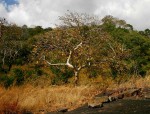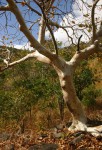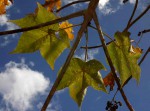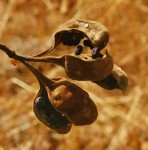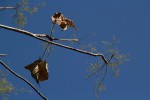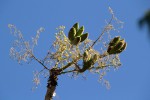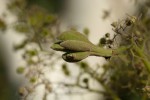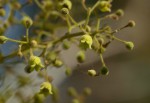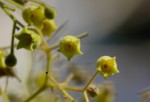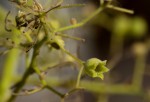Sterculia quinqueloba
Selected images: Click on each image to see a larger version and details of the record View all images (27)
Detailed records: Display species records QDS maps by: Google Maps Point records by Google Maps
Species details: Click on each item to see an explanation of that item (Note: opens a new window)
| Synonyms: |
Cola quinqueloba Garcke Sterculia livingstoniana Engl. ? |
| Common names: | Large-leaved star-chestnut (English) |
| Frequency: | Common |
| Status: | Native |
| Description: |
Medium-sized deciduous tree. Bark smooth cream to pinkish brown, flaking. Leaves crowded near the ends of branches, large, 5-lobed. Flowers yellow, in branched terminal heads, unisexual, both sexes on the same inflorescence. Fruit consisting of 5 separate carpels, covered in golden velvet hairs. The carpels split to show black seeds attached to the rim amidst irritant hairs. |
| Type location: |
Mozambique |
| Notes: | |
| Derivation of specific name: | quinqueloba: with five lobes |
| Habitat: | In woodland and on rocky hillsides and kopjes. |
| Altitude range: (metres) | Up to 1590 m |
| Flowering time: | Jan - Apr |
| Worldwide distribution: | D.R. Congo, Katanga, Tanzania, Mozambique, Malawi, Zimbabwe, Namibia, Angola. |
| FZ divisions: | N,Z,T,MS |
| Growth form(s): | Tree, shrub over 2 m. |
| Endemic status: | |
| Red data list status: | |
| Insects associated with this species: | |
| Spot characters: | Display spot characters for this species |
| Images last updated: | Friday 6 November 2015 |
| Literature: |
Burrows, J.E., Burrows, S.M., Lötter, M.C. & Schmidt, E. (2018). Trees and Shrubs Mozambique Publishing Print Matters (Pty), Cape Town. Page 595. (Includes a picture). Coates Palgrave, K. (revised and updated by Meg Coates Palgrave) (2002). Trees of Southern Africa 3rd edition. Struik, South Africa Page 216. (Includes a picture). Coates Palgrave, K. et al. (1956). Trees of Central Africa National Publications Trust, Salisbury. Pages 419 - 422. (Includes a picture). Drummond, R.B. (1975). A list of trees, shrubs and woody climbers indigenous or naturalised in Rhodesia. Kirkia 10(1) Page 260. Drummond, R.B. (1981). Common Trees of the Central Watershed Woodlands of Zimbabwe. Natural Resources Board, Harare. Pages 142 - 143. (Includes a picture). Fowler, D.G. (2007). Zambian Plants: Their Vernacular Names and Uses, Kew Publishing Mapaura, A. & Timberlake, J. (eds) (2004). A checklist of Zimbabwean vascular plants Southern African Botanical Diversity Network Report No. 33 Sabonet, Pretoria and Harare Meerts, P. & Hasson, M. (2016). Arbres et arbustes du Haut-Katanga Jardin Botanique Meise, Belgique Page 197. (Includes a picture). Ntore, S. & al. (2024). Checklist of the vascular plants of Burundi Page 159. Phiri, P.S.M. (2005). A Checklist of Zambian Vascular Plants Southern African Botanical Diversity Network Report No. 32 Page 75. Smith, P. & Allen, Q. (2004). Field Guide to the Trees and Shrubs of the Miombo Woodlands Royal Botanic Gardens, Kew ISBN 1 84246 073 0 Pages 80 - 81. (Includes a picture). Steedman, E.C. (1933). Some Trees, Shrubs and Lianes of Southern Rhodesia. Page 50. Storrs, A.E.G. (1995). Know Your Trees Regional Soil Conservation Unit. Pages 99 - 100. (Includes a picture). Strugnell, A.M. (2006). A Checklist of the Spermatophytes of Mount Mulanje, Malawi Scripta Botanica Belgica 34 National Botanic Garden of Belgium Page 179. Van Wyk, B. & Van Wyk, P. (1997). Field Guide to Trees of Southern Africa. Struik, South Africa Pages 236 - 237. (Includes a picture). White, F. (1962). Forest Flora of Northern Rhodesia Oxford Univ. Press. Page 246. Wild, H. (1960-1). Sterculiaceae Flora Zambesiaca 1(2) Pages 555 - 556. (Includes a picture). |
Other sources of information about Sterculia quinqueloba:
Our websites:
Flora of Burundi: Sterculia quinquelobaFlora of the DRC: Sterculia quinqueloba
Flora of Malawi: Sterculia quinqueloba
Flora of Zambia: Sterculia quinqueloba
Flora of Zimbabwe: Sterculia quinqueloba
External websites:
African Plants: A Photo Guide (Senckenberg): Sterculia quinquelobaAfrican Plant Database: Sterculia quinqueloba
BHL (Biodiversity Heritage Library): Sterculia quinqueloba
EOL (Encyclopedia of Life): Sterculia quinqueloba
GBIF (Global Biodiversity Information Facility): Sterculia quinqueloba
Google: Web - Images - Scholar
iNaturalist: Sterculia quinqueloba
IPNI (International Plant Names Index): Sterculia quinqueloba
JSTOR Plant Science: Sterculia quinqueloba
Mansfeld World Database of Agricultural and Horticultural Crops: Sterculia quinqueloba
Plants of the World Online: Sterculia quinqueloba
Tropicos: Sterculia quinqueloba
Wikipedia: Sterculia quinqueloba
